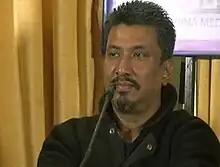Nhyoo Bajracharya न्ह्यू बज्राचार्य | |
|---|---|
 Nhyoo Bajracharya in 28 September 2014 in a Television show | |
| Background information | |
| Born | September 15, 1964[1] Kathmandu, Nepal |
| Occupation(s) | Singer, composer, lyricist |
| Years active | 1987–present |
| Website | |
Nhyoo Bajracharya (Nepal Bhasa न्ह्यू बज्राचार्य) is a Nepali composer, lyricist, and singer.[2] He is widely regarded as one of the best music composers in Nepali music industry.[3] He has composed hundreds of famous songs[4] in Nepali, Newar and Hindi, and one song in Chinese. He is also remembered for his compositions for Ani Choying Dolma with his fusion style music. Some of his hit compositions are Saya Thari Baja Eutai Taal, Shanti Lukau Kaha, Phool ko Aakhama, Laaija Chari, Kya Bore Bhayo, Aadhi Baato Hide Pachi Timi Sita Bhet Vayo, Orali Lageko,[5] among many others. He has also sung some of the songs but he is better known as a music composer. His songs have been sung by Ani Choying Dolma, Ram Krishna Dhakal, Yogeshwor Amatya, Shreya Ghosal and other singers.
He regards winning a national music competition organized by Radio Nepal in 1987/88 as one of the turning points in his career. One of the judges in the competition was Swar Samrat Narayan Gopal, who was also a winner of that competition held several years before.
His influences in music composition are Gopal Yonjan, Naati Kaji. He is one of the three judges of the Nepal Idol.[6]
References
- ↑ "Nhyoo Bajracharya details on Radio Kantipur". Radio Kantipur. Retrieved 24 July 2022.
- ↑ "Yogi, Nhyoo and Jems jam together virtually supporting youth voice against corruption; offer flowers to police personnel as a gesture of friendship". The Himalayan Times. 15 June 2020. Retrieved 30 December 2020.
- ↑ "Calling the tune". kathmandupost.com. Retrieved 30 December 2020.
- ↑ Republica. "Kamana Awards 2076 concludes with much fanfare". My City. Retrieved 30 December 2020.
- ↑ "CS : CyberSansar.com – Nhyoo Bajracharya and Shweta Punjali perform live in Bangkok". www.cybersansar.com. Retrieved 30 December 2020.
- ↑ "Nepal Idol – One Day Can Change Your Life". Mero Kalam. 6 January 2017. Retrieved 30 December 2020.